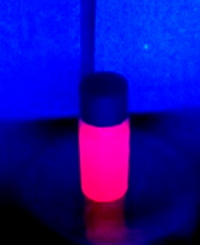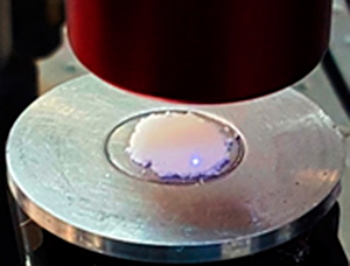DESIGN OF LUMINISCENT MATERIALS FOR USE IN DIFFERENT OPTICAL DEVICES
|
Description |
In the research group UCM Hybrid Inorganic-Organic Materials directed by Dr. Josefa Isasi fluorescent materials are prepared. These materials consist of zircon and NASICON host networks to which different lanthanide cations are incorporated. The objective is the isolation of nanofósforos that emit in the blue - green and that they are used to generate a white light of high luminosity.
In today's society there is a growing interest in developing materials that exhibit different properties. For this reason, the scientists investigate the design and development of synthesis methods that allow the control, at different scales, of the microstructure of the resulting materials. And even on the nanometric scale, since, as has been shown, the size and shape of the particles are as important parameters, as is the composition, in the search for different properties.
Nanophosphors exhibit properties very different from their bulk counterparts, for which the study of these materials is a topic of current interest to the scientific community.
|
How does it work |

Photograph of emission in solution under UV excitation, of some of the nanophosphors that have been synthesized in our laboratories.
In the UCM research group ORGANIC INORGANIC HYBRID MATERIALS are synthesized and characterize luminescent nanophosphors of different composition that emit over a wide range of wavelengths within the visible spectrum.
The optical properties of these materials are strongly influenced by both the size and shape of their constituent particles and this, in turn, depends on the method of preparation of the material in question. The members of the research group use methods of preparation that allow better microstructural control.
The obtained nanophosphors offer a powerful and sharp luminescent emission of high quality, in the presence of UV radiation, both in solid state and in solution. For this reason, they are suitable for use in different optical devices.
|
Advantages |
The synthesis methods used in our research offer a prolific way to obtain luminescent materials with better performance. These include: high luminous performance over a wide emission range and high chemical stability.
|
Where has it been developed |
These investigation has been developed in the UCM research group INORGANIC-ORGANIC HYBRID MATERIALS. The group members have a wide range of knowledge since for years they have investigated in related lines.
|
And also |
The hybrid materials group has the necessary technology to undertake the preparation and study of luminescent materials. The team members have extensive experience in the synthesis and interpretation of properties, as well as being experts in the management of different techniques of structural and morphological characterization.
|
Contact |
|
© Office for the Transfer of Research Results – UCM |
|
PDF Downloads |
|
Classification |
|
Responsible Researcher |
Josefa Isasi Marín: isasi@quim.ucm.es
Department: Inorganic Chemistry I
Faculty: Chemical Sciences



